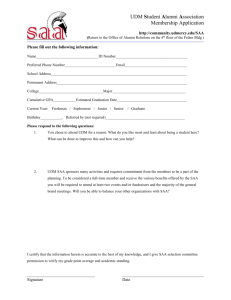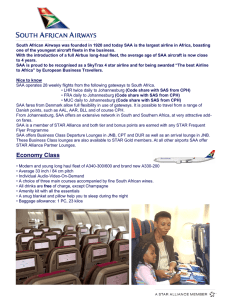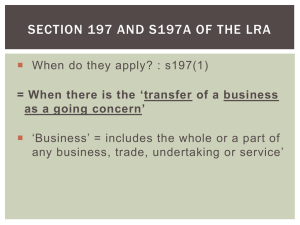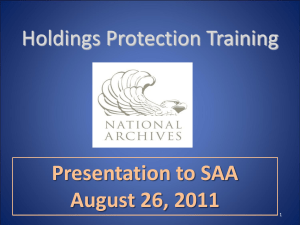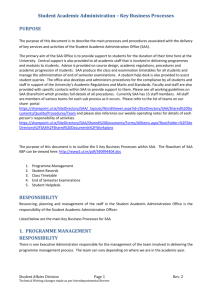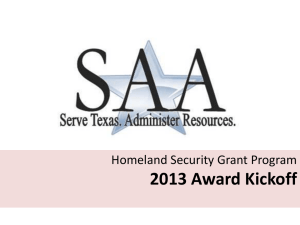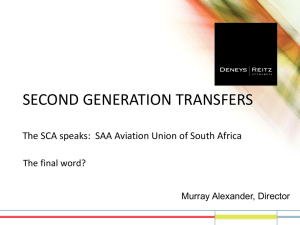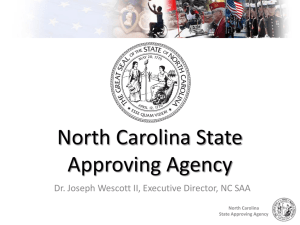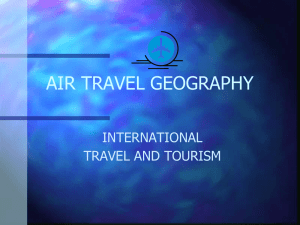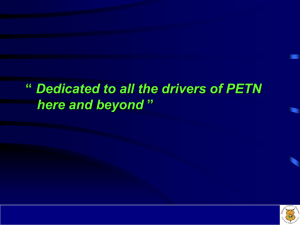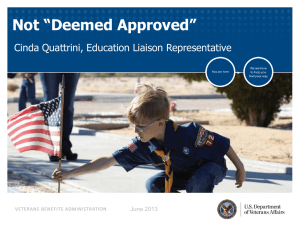SAA financial results presentation
advertisement
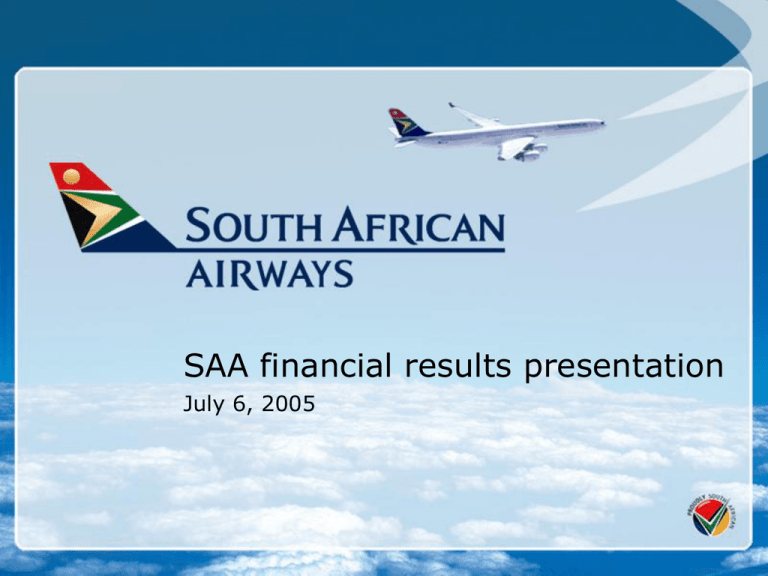
SAA financial results presentation July 6, 2005 Agenda • Industry Overview • Strategic Overview • Financial highlights • Financial Review • Conclusion and way forward Key messages • The airline industry remains a challenge for value creation • Competitors target multiple strategic thrusts to create value • SAA is well positioned to capture a significant number of growth opportunities • SAA has taken off to capture these opportunities based on an optimized business system Creating shareholder value is a continuous challenge for airlines . . . Total return to shareholders, 1982–2004 Index, 100 = Jan 1982 3 500 3 000 S&P 500 2 500 2 000 1 500 1 000 500 S&P Airlines 0 1/1/86 1/1/86 1/1/90 1/1/94 1/1/98 1/1/02 … despite increasing load factors Return on capital employed, 1970-2004, all airlines % pre-tax 20 15 10 5 WAAC ROIC trend 0 -5 -10 1970 1980 1990 2000 … despite increasing load factors Load factors in %, 1993 – 2003 all airlines Index 1993, 100=61,5% 110 108 106 104 102 100 98 96 1993 1994 1995 1996 1997 1998 1999 2000 2001 2002 2003 … despite increasing load factors Load factors in %, 1993 – 2003 all airlines Index 1993, 100=61,5% 105 100 95 90 85 80 75 1993 1994 1995 1996 1997 1998 1999 2000 2001 2002 2003 … operating in a generally difficult external environment Low entry barriers, high exit barriers Strong government influence Increasing pricing Pressure from customers Highly cyclical Needs to be managed High operational and financial gearing Industry fragmentation Oligopolistic suppliers and labour High capital intensity However, consistently, across regions, several new airlines are out-performing regional industry leaders (1/3) USA Operating margin, % of revenues (2003) 8 16,6 -2,4 Market capitalisation (US$ bn, October, 27 2004) Market capitalisation /sales ratio 2,9 0,06 9,0 1,7 1,70 AA/UA/DL South-west 1,90 JetBlue However, consistently, across regions, several new airlines are out-performing regional industry leaders (2/3) EUROPE Operating margin, % of revenues (2003) Market capitalisation (US$ bn, October, 27 2004) Market capitalisation /sales ratio 25,0 2,1 5,2 11,0 2,8 0,9 0,45 0,65 L/H/BA/AF EasyJet 2,64 Ryanair However, consistently, across regions, several new airlines are out-performing regional industry leaders (3/3) AUSTRALIA Operating margin, % of revenues (2003) Market capitalisation (US$ bn, October, 27 2004) 2,1 4,5 0,56 Market capitalisation /sales ratio Qantas 16,0 1,0 1,32 Virgin Blue … and threatening strategic moves from competitors Competitor landscape Examples Low cost operators • Rise of short-haul LCC • Creation of lower cost global networks • Redefinition of mainline business models • Ryanair, Southwest • Emirates, Qatar • Aer Lingus, BMI Network and fleet (r)evolution • Increased network (re-)segmentation • A/C innovation in long-haul (e.g., A380, B777, A350) • Air France, SAS • Virgin Atlantic, LH, Emirates, BA Alliances and partnerships • Selective cooperation (even within global alliances) • Co-existence of bilateral agreements with alliance membership • LH/SIA • LAN Chile Simplification • Growing cost-effective distribution channels / e-commerce • Easy check-in and boarding (eg, e-ticketing, RFID, check-in kiosks) • Easyjet, British Airways • Delta Airlines, American Airlines Agenda • Industry Overview • Strategic Overview • Financial highlights • Financial Review • Conclusion and way forward However, SAA is well positioned to capture global growth opportunities . . . Grow global network coverage with STAR and bilateral partners Offer advanced products and services to become premium long-haul passenger airline Become leading African network operator Develop SAA Cargo as operator of first choice in the subsaharan region Regain domestic market share through strong competitive response to fast growing SA LCC Offer extended technical services to STAR alliances and other airlines … enforced by the strategic framework of the three pillars Profit, Patronage, and People Develop and nurture world class talent through enhanced training and performance management Three pillar framework as foundation for SAA strategic thrusts Provide sustainable return on invested capital to investors Provide seamless travel experience to our customers and deliver excellent internal support services A comprehensive change program has been set-up to build SAA´s three pillars . . . (1/3) Key Initiatives 1 • Redesign of organisational structure • Collapsing management structures • Focus on Risk Management • People • Customer services training of all SAA employees started • Sales organization restructure and sales forces trained Major recent achievements 1 • New SAA leadership group in place, based on the ff principles: – A focus on People – A focus on strengthening Risk Management • People – An Aggressive focus on Customer Service through out the organization – A culture of excellence with profit and cost control. SAA Structure Prior to Restructuring Company Secretary Board Deputy CEO CEO EVP Human Resources and Transformation VP:Human Resource EVP Operations and Customer Service VP: Operations VP: Western Cape Business Dev VP : CSSE EVP Subsidiaries EVP Commercial EVP and CFO VP:Subsidiaries VP: Cargo VP:Marketing VP: Customer Service VP:Global Pax Services & OCC VP:Global Sales VP Alliance, Network & Revenue Management VP : Legal VP : Treasury VP : Finance CI O VP : Fleet VP : Comms & Gov Liaison EVP SAA Technical New SAA high-level structure – Company Secretary 2 Board CEO CFO CRO Safety and Security Head of Network, Planning and Distribution General Sales Manager GM Communications / Customer General Counsel GM Business Development GM Human Resources COO Head of Marketing Head of Passenger Services Head of Technical Operations General Manager Cargo CIO A comprehensive change program has been set-up to build SAA´s three pillars . . . (2/3) Key Initiatives 2 Revenue • STAR alliance and bilateral agreements • African growth strategy • Asian market entrance • Cargo business aspirations • Profit Cost • Bambanani Program (PIP) • Zero agency commission rollout well underway • Aircraft loans and leases • Reservations system migration (Amadeus) Major recent achievements 2 • Daily flights on routes (eg, Mumbai, Zurich, Paris, Sao Paulo) • Profit • New routes to Washington, Zanzibar, Livingstone • New code-share agreement with United, Austrian Alliances and network development Highlights • Delta relationship extended for 2y • Start code-share negotiations with United Airlines (Washington) • Code-share discussions with LOT, SAS, and TAP • Code-share with Austrian Airlines effective July 2005 • Daily flights FRA-CPT / ZRH-JNB • 6 new/amended agreements on route rights (e.g., Mali, DRC, Gabon) • Licences obtained for 7 African destinations (e.g., Kinshasa, Lagos, Zanzibar) • Significant opportunities for SAA to connect African countries to RoW via via STAR • Daily services to Sao Paulo (code-share with Varig) 2 • Daily services to Mumbai • Thai International to introduce service to SAA (code-share) • MOU´s with Jet Airways, Asiana (code-share) • Easier access to Singapore, Japan, South Korea and China via STAR • Qantas relationship continued • Review of Cathy cooperation • Easier access to New Zealand via STAR • Reciprocal FFP with VA Airways A comprehensive change program has been set-up to build SAA´s three pillars . . . (2/3) Key Initiatives 3 • Patronage • Product improvement, eg Lie-flat to LON • Star Alliance – FFP, Lounges • Service standards review Major recent achievements 3 • VIP program • SA tourism and tour operator • Patronage • Customer service training underway • Sales training completed …. and there is more to come • . . . Talent and performance management • . . . Distribution strategy • . . . Working capital optimisation Agenda • Industry Overview • Strategic Overview • Financial highlights • Financial Review • Conclusion and way forward Positive financial results support SAA’s new way forward Revenues • 6,8% increase in total revenues vs 2004 % more passengers flown • Average load factor grown from 67% to now 70% 20 000 15 000 10 000 5 000 0 2001 2002 2003 2004 2005 • Rm 10 5 0 -5 -10 -15 -20 6 2 1 2003 2004 -10 -16 2001 2002 2005 • 6% improvement in gross profit margin despite the increase in oil price of more than 40% First positive impact from – Strict operating cost control – Materialisation of operating efficiencies – 1,9% growth in costs Positive financial results support SAA’s new way forward Net assets employed 10 000 6 028 5 000 3 884 2 228 • SAA beginning to create value for shareholders 0 -1 337 -2 697 -5 000 2001 2002 2003 • Net asset value improved drastically to R2 billion 2004 2005 Positive financial results support SAA’s new way forward Net profit 5000 • High positive net profit of R966m Compared to last year’s historic net loss of R8 610m 0 -5000 -10000 2001 2002 2003 2004 2005 Cash generated from operations 2 000 • R1 911 million cash generated from operations. • R1 600 million to be paid to Transnet 1 500 1 000 500 0 2001 2002 2003 2004 2005 R10 billion turnaround Agenda • Industry Overview • Strategic Overview • Financial highlights • Financial Review • Conclusion and way forward Financial review Improvements in operating margins 2005 % change 2004 Total airline income 17 442 6,8 16 339 Operating costs before ownership 14 451 4,2 13 864 2 991 20,8 2 475 EBITDAR EBITDAR margin Depreciation, amortisation and leases EBIT (before impairments and fair value movements) EBIT margin 17,1% 2 056 15,1% (12,2) 2 341 935 134 5,3% 0,8% Financial review R 10 billion turnaround 2005 % change 2004 Total airline income 1 17 442 6,8 16 339 Operating costs 2 (16 507) 1,9 (16 205) 935 > 100 134 (141) (95,9) (3 410) 16 > 100 (331) 342 > 100 (4 470) (186) (65,1) (533) 966 > 100 (8 610) Gross profit Impairments Other Fair value movement Net interest paid Net profit for the year 3 Airline income – 1 20 000 15 000 Increase Total airline income 10 000 6,8% 5 000 0 2001 2002 2003 2004 2004 2005 12% 16% 9% 9% 75% Passenger revenue 2005 Cargo Other 79% Passenger revenue Cargo Other Passenger revenue analysis Passenger numbers 5% Rand appreciation 14% 2004 2005 25% 26% 59% 16% International Regional Domestic 58% 16% International Regional Domestic Operating costs – 2 Cost increase BELOW inflation 2005 % Change 2004 1 585 1,9 1 556 Accommodation and refreshments 442 (19,1) 546 Depreciation and amortisation 471 (40) 785 1 766 (6,5) 1 888 486 (23,2) 633 Energy 3 345 18,6 2 820 Labour 3 266 5,9 3 084 Material 1 141 (2,2) 1 167 890 3,9 857 3 115 8,6 2 869 16 507 1,9 16 205 Aircraft lease costs Distribution costs Electronic data costs Navigation, landing and parking fees Other operating costs Operating efficiencies – 2 Gross Profit Margin • Despite > 40% US$ oil price in 10 5 5 2 1 2003 2004 0 -5 -10 -10 -15 -20 -16 2001 Operating cost to revenue ratio 2002 2005 2005 2004 94,64% 99,18% Net profit – 3 SAA returns to profitability 4 000 2 144 2 000 966 340 0 -2 000 -4 000 -6 000 -5 977 -8 000 -8 610 -10 000 2001 2002 2003 2004 2005 Balance sheet Settlement of hedge book – R 5,9 billion 2005 2004 Non-current assets 9 783 9 433 Current assets 6 644 7 454 16 427 16 887 Capital and reserves 2 228 (2 697) Non-current liabilities 5 858 4 789 - 5 957 8 341 8 838 16 427 16 887 6,2% < 0% Total assets Current liabilities - Derivative liability - Other Total equity and liabilities Return on market value of operated aircraft Cash flow statement Strict working capital management generates R749 million Cash generated from operations 2 500 1 985 1 911 2 000 1 500 872 1 000 741 500 169 0 2001 2002 2003 2004 2005 2005 2004 1 911 741 Net interest and derivatives (6 108) (2 144) Net cash outflow (4 197) (1 403) Cash flow from investing activities (188) (4 422) Cash from financing activities 4 029 8 144 Increase/(decrease) in cash (356) 2 319 Cash at end of year 2 614 2 977 Cash generated from operations Post-balance sheet event • SAA Recapitalisation – Transnet’s continued support to SAA – Amendment to terms of Compulsorily Convertible Subordinated Loan of R 4 billion • SAA to be recapitalised by R 2,4 billion • R1,6 billion to be repaid to Transnet – Renewal of credit facility of R1,5 billion Agenda • Industry Overview • Strategic Overview • Financial highlights • Financial Review • Conclusion and way forward SAA priorities going forward – Passenger unit SAA priorities going forward • Review of business model for SAA short-haul network Low cost operators Challenges • Further declining yields • SA LCC´s adding further routes to their network • Revisit of SAA long-haul fleet strategy (B747, A340, A380, B777) • Declining yields on long-haul based on A380 economics • Soccer World Cup 2010 Network and fleet (r)evolution • Bilateral negotiations • Aggressive implementation of African growth (licenses, rights) • RSA competition authority • Airport infrastructure Alliances & partnerships Simplification • STAR migration • IT challenges • Increase network connectivity via additional bilateral and STAR related partnerships • Balance STAR members interests with SAA priorities • Continue existing Bambanani and line functional initiatives to become a cost-effective and realiable airline • Training needs • Changes in mindset and capabilities And . . . • Implementation of a global Cargo strategy to – Grow SAA´s global market share on most profitable routes – Become preferred Air Cargo carrier in the sub-Saharan region • Optimal Capital Structure – Build capital and reserves • SAA separation from Transnet by March 2006 – SAA (98% owned by Transnet) will be spun off to the South African government – A joint team has been established to formulate SAA’s exit from Transnet – The Team expects the SAA exit from Transnet to be completed by March 2006 Focus Going Forward continues . . . Revenue Cost This will require a change in mindset and a focus Profitability Productivity and Efficiency on our customers Thank you Any questions?
